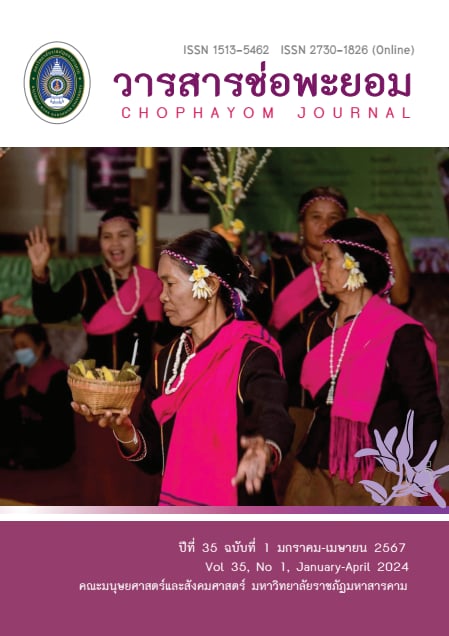Kaen Isan Wat: Integrated Learning Space for Secondary School Students through the Creation of Local Culture-based Theatre
Keywords:
Applied Theatre, Local Cultural-based Theatre, Integrated Learning, Kaen Isan WatAbstract
This article presents the Kaen Isan Wat Project, which operated from 2019 to 2023. Its primary objective is to examine, analyze, and elucidate the principles and practices of the project. The Kaen Isan Wat Project integrates theatre arts, education, and local culture by establishing theatre production areas for secondary school students in northeastern Thailand. The author employed a method to gather information from various sources and applied the concept of theatre to integrate learning management as the analytical framework. The study's finding revealed that the Kaen Isan Wat Project has developed activity based on annually established questions and concepts. Theater-making workshops were conducted to impart fundamental knowledge to students and to enable them to utilize local community areas as learning bases through the integration of two forms: intradisciplinary and interdisciplinary. Notably, the project has sparked a creative phenomenon in secondary school students, unlike other student theatre competitions organized by the Ministry of Education in Thailand. Students are encouraged to explore their potential, including crafting local narratives that deeply reflect community cultural values. This creative youth theater initiative offers a new alternative to the prevailing stories and dramas in Thai society.
Keywords: Applied Theatre, Local Cultural-based Theatre, Integrated Learning, Kaen Isan Wat
References
กระทรวงศึกษาธิการ. (2551). หลักสูตรแกนกลางการศึกษาขั้นพื้นฐาน พุทธศักราช 2551. กรุงเทพฯ: โรงพิมพ์ชุมนุมสหกรณ์การเกษตรแห่งประเทศไทย.
กระทรวงศึกษาธิการ. (2566). แผนพัฒนาการศึกษาขั้นพื้นฐาน (พ.ศ. 2566-2570) ของสำนักงานคณะกรรมการการศึกษาขั้นพื้นฐาน. กรุงเทพฯ: สำนักงานคณะกรรมการการศึกษาขั้นพื้นฐาน.
กุลิสรา จิตรชญาวณิช. (2562). การจัดการเรียนรู้. กรุงเทพฯ: สำนักพิมพ์จุฬาลงกรณ์มหาวิทยาลัย.
ชนาธิป พรกุล. (2561). กระบวนการสร้างความรู้ของครู กรณีการสอนบูรณาการ. กรุงเทพฯ : โรงพิมพ์แห่งจุฬาลงกรณ์มหาวิทยาลัย.
พชญ อัคพราหมณ์. (2563). สุดสะแนน-สาวะถี: การออกแบบกิจกรรมละครฐานชุมชนและสร้างสรรค์การแสดง เพื่อบอกเล่าความทรงจำร่วมของคนอีสาน. วารสารศิลปกรรมศาสตร์ มหาวิทยาลัยขอนแก่น, 12(1), 271-313.
พรรัตน์ ดำรุง. (2557). ละครประยุกต์ การใช้ละครเพื่อการพัฒนา. กรุงเทพฯ: สำนักพิมพ์แห่งจุฬาลงกรณ์มหาวิทยาลัย.
ลิขิต ธีรเวคิน. (2552). การสร้างรัฐและการสร้างชาติ. สืบค้นเมื่อ 6 มกราคม 2567, จาก https://mgronline.com/daily/detail/9520000048092.
วรรณดี สุทธินรากร และคณะ. (2564). การพัฒนาหลักสูตรฐานสมรรถนะและการจัดการเรียนรู้อย่างมีความหมาย. กรุงเทพฯ: สยามปริทัศน์.
สิริพัชร์ เจษฎาวิโรจน์. (2546). การจัดการเรียนการสอนแบบบูรณาการ. กรุงเทพฯ: บุ๊ค พอยท์.
Prendergast, M., Saxton, J. (2009). Applied Theatre: Globalized Case Studies and Challenges for practice. Bristol: Intellect.
Downloads
Published
How to Cite
Issue
Section
License
Copyright (c) 2024 Chophayom Journal

This work is licensed under a Creative Commons Attribution-NonCommercial-NoDerivatives 4.0 International License.






